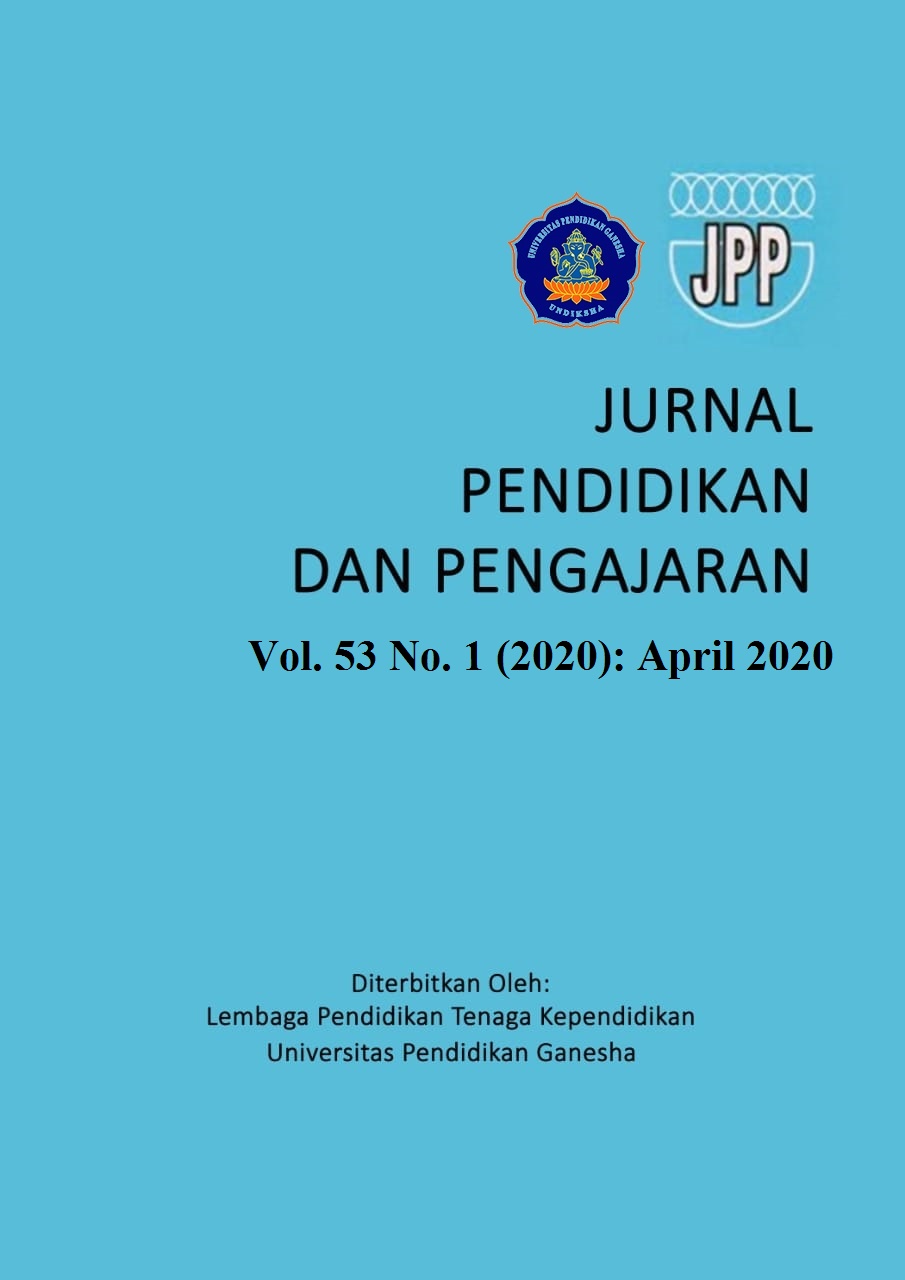Increasing Teachers’ Work Engagement Through Servant Leadership, Organizational Culture, and Job Satisfaction
DOI:
https://doi.org/10.23887/jpp.v53i1.24911Keywords:
servant leadership, job satisfaction, organizational culture, work engagementAbstract
As an educational institution that teaches Christian values, Christian schools can play a role in building the character of the nation through education and science in accordance with Christian values. For those role it is necessary for the schools to employ committed human resources. Most of previously done research on work engagement involved factors of leadership style and job satisfaction, yet, very few included organizational culture. This research aimed to determine the effect of servant leadership, organizational culture and job satisfaction on work engagement. The research subjects were 63 teachers at junior high and senior high Christian schools located in West Jakarta. The research design used the path analysis through PLS-SEM method. The results showed that the servant leadership and organizational culture have a positive effect on job satisfaction and work engagement, but lacking evidence to prove the job satisfaction effects the work engagement. Therefore, to improve the teachers’ work engagement, one need to pay attention on two key factors: the leadership style that serves from the principal and conducive organizational culture.
References
Bigliardi, B., Dormio, A. I., Galati, F., & Schiuma, G. (2012). The impact of organizational culture on the job satisfaction of knowledge workers. VINE, 42(1), 36–51. https://doi.org/10.1108/03055721211207752
Colquitt, J. A., Lepine, J. A., & Wilson, M. J. (2015). Organizational behavior: Improving performance and commitment in the workplace (4th ed.). New York, NY: McGraw-Hill.
Greenleaf, R. K. (2002). Servant leadership: A Journey into the nature of legitimate power & greatness (25th ed.). New York, NY: Paulist Press.
Harwiki, W. (2013). The influence of servant leadership on organization culture, organizational commitment, organizational citizenship behavior and employees performance (Study of outstanding cooperatives in East Java Province, Indonesia). Journal of Economics and Behavioral Studies, 5(12), 876-885. https://doi.org/10.22610/jebs.v5i12.460
Kaur, P. (2018). Mediator analysis of job satisfaction: Relationship between servant leadership and employee engagement. Metamorphosis: A Journal of Management Research, 17(2), 76-85. https://doi.org/10.1177/0972622518804025
Kembau, J. B., Sendow, G. M., & Tawas, H. N. (2018). Pengaruh Keterlibatan Kerja dan Kompetensi Kerja Terhadap Kepuasan Kerja dan Kinerja Guru Sekolah Dasar di Kecamatan Malalayang Kota Manado. Jurnal EMBA: Jurnal Riset Ekonomi, Manajemen, Bisnis Dan Akuntansi, 6(4). https://doi.org/10.26623/jreb.v11i3.1143
Koesmono, H. T. (2014). The influence of organizational culture, servant leadership, and job satisfaction toward organizational commitment and job performance through work motivation as moderating variables for lecturers in Economics and Management of Private Universities in East Surabaya. Educational Research International, 3(4), 25-39. Retrieved from http://erint.savap.org.pk/PDF/Vol.3(4)/ERInt.2014(3.4-04).pdf
Leh, L. Y., & Bin Ibrahim, Z. H. (2019). The influence of feedback environment towards job satisfaction in Tvet education organization. JPI (Jurnal Pendidikan Indonesia), 8(1), 96-104. https://ejournal.undiksha.ac.id/index.php/JPI/article/view/16471
Lo, J. W. (2018). Pemuridan intensional dalam Gereja tradisional. Jakarta, Indonesia: Creativindo.
Man, G. S., & Hadi, C. (2013). Hubungan antara perceived organizational support dengan work engagement pada guru SMA swasta di Surabaya. Jurnal Psikologi Industri dan Organisasi, 2(2), 90-99. https://doi.org/10.26740/jptt.v3n2.p141-148
Nadeak, E. H., & Hidayat, D. (2017). Karakteristik pendidikan yang menebus di suatu sekolah Kristen [The characteristics of redemptive education in a Christian school]. Polyglot: Jurnal Ilmiah, 13(2), 87-98. https://doi.org/10.19166/pji.v13i2.439
Raman, A., Ying, L. T., & Khalid, R. (2015). The relationsip between culture and organizational commitment among Chinese primary school teachers. Mediterranean Journal of Social Sciences, 6(2), 93-100. https://doi.org/10.5901/mjss.2015.v6n2s5p93
Safaria, Siti., & Yunastiwi, A. Y. (2013). Pengaruh Keterlibatan Kerja Terhadap Kinerja Pegawai Pada PT SEASCAPE SURVEYS INDONESIA. E-Jurnal manajemen dan Bisnis, Vol 1, no.1 ISSN 2355-0244 https://repository.perbanas.id/xmlui/ bitstream/handle/123456789/1378/PENGARUH%20KETERLIBATAN%20KERJA%20TERHADAP%20KINERJA%20PEGAWAI%20PADA%20PT%20SEASCAPE%20SURVEYS%20INDONESIA.pdf?sequence=1
Sendjaya, S. (2012). Jadilah pemimpin demi Kristus. Jakarta, Indonesia: Literatur Perkantas.
Setyaningrum, R. P., Setiawan, M., & Surachman. (2017). Organizational commitments are mediation of relationships between servant leadership and employee performance. Jurnal Aplikasi Manajemen, 15(4), 693-701. https://doi.org/10.21776 /ub.jam2017.015.04.17
Sharma, H., & Yadav, R. (2018). The relationship between organizational justice and work engagement: trust as a mediator. Prabandhan: Indian Journal of Management, 11(3), 50-61. https://doi.org/10.17010/pijom/2018/v11i3/122078
Turkmen, F., & Gul, I. (2017). The effects of secondary school administrators ‘servant leadership behaviors on teachers’ organizational commitment. Journal of Education and Training Studies, 5(12), 110-119. https://doi.org/10.11114/jets.v5i12.2713
Downloads
Published
How to Cite
Issue
Section
License
Authors who publish with Jurnal Pendidikan dan Pengajaran agree to the following terms:- Authors retain copyright and grant the journal the right of first publication with the work simultaneously licensed under a Creative Commons Attribution License (CC BY-SA 4.0) that allows others to share the work with an acknowledgment of the work's authorship and initial publication in this journal
- Authors are able to enter into separate, additional contractual arrangements for the non-exclusive distribution of the journal's published version of the work (e.g., post it to an institutional repository or publish it in a book), with an acknowledgment of its initial publication in this journal.
- Authors are permitted and encouraged to post their work online (e.g., in institutional repositories or on their website) prior to and during the submission process, as it can lead to productive exchanges, as well as earlier and greater citation of published work. (See The Effect of Open Access)





